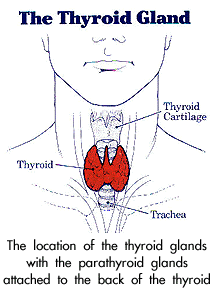
|
|
DIRECTORY |
|
What is Hypothyroidism?  Hypothyroidism is second only to diabetes
mellitus as the most common endocrine
disorder in the United States, and its
prevalence may be as high as 18 cases per
1,000 persons in the general population.
The disorder becomes increasingly
common with advancing age, affecting about 2
to 3 percent of older women.
Because hypothyroidism is so common, family
physicians need to know how to diagnose the
disorder and select appropriate thyroid
hormone replacement therapy. Hypothyroidism is second only to diabetes
mellitus as the most common endocrine
disorder in the United States, and its
prevalence may be as high as 18 cases per
1,000 persons in the general population.
The disorder becomes increasingly
common with advancing age, affecting about 2
to 3 percent of older women.
Because hypothyroidism is so common, family
physicians need to know how to diagnose the
disorder and select appropriate thyroid
hormone replacement therapy.
Hypothyroidism is the condition in which the thyroid is under active (i.e., it is producing an insufficient amount of thyroid hormones). Hypothyroidism is the most common thyroid disorder. Severe hypothyroidism can lead to a condition called myxedema, characterized by dry, thickened skin and coarse facial features.
Causes of hypothyroidism:
Untreated
hypothyroidism may lead to anemia, low body
temperature, and heart failure. A condition
called secondary hypothyroidism sometimes
occurs as a result of a failing pituitary
gland. When the pituitary gland fails, it no
longer stimulates the thyroid to produce
thyroid hormones.
Treatment of hypothyroidism:
Treatment may include prescription of thyroid hormones to replace the deficient hormones. Dosage of thyroid hormone may need to be increased over the years. Yearly or biyearly checkups are usually required to ensure the proper dosage of thyroid hormones is taken. A patient usually takes thyroid hormones for the rest of his/her life.
If you have hypothyroidism you most likely have a hormonal imbalance, and likely, your doctor may start you on synthetic thyroid hormone pills that you may need to continue for the rest of your life. Periodic blood work will be done to make sure the thyroid is functioning properly. Imperial Gold Maca™ is different and keeps nourishing the body as a whole and allows the body to rid unwanted conditions naturally and safely through its adaptogenic qualities.
Imperial Gold Maca™ adapts to the body's needs and supports hormonal imbalances and addresses thyroidal conditions very well. If your looking for spectacular results and want a money back guarantee, increased physical stamina, energy, increased mental clarity and focus, a feeling of well being for men and women of all ages, then you have noting to lose by trying Imperial Gold Maca™ TRY SOME NOW READ MORE ABOUT WHAT IT IS
|




 Imperial
Gold Maca™
Imperial
Gold Maca™